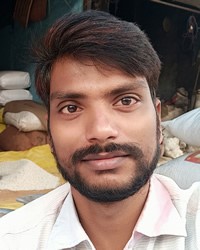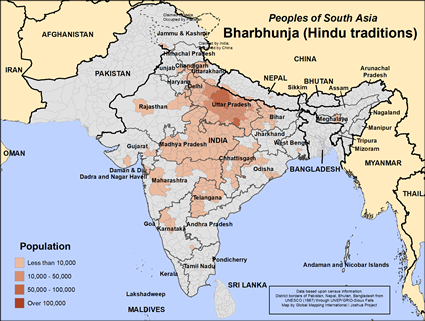Bharbhunja (Hindu traditions) in India

Photo Source:
Anonymous
|

Map Source:
People Group data: Omid. Map geography: UNESCO / GMI. Map Design: Joshua Project.
|
| People Name: | Bharbhunja (Hindu traditions) |
| Country: | India |
| 10/40 Window: | Yes |
| Population: | 1,237,000 |
| World Population: | 1,237,000 |
| Primary Language: | Hindi |
| Primary Religion: | Hinduism |
| Christian Adherents: | 0.00 % |
| Evangelicals: | 0.00 % |
| Scripture: | Complete Bible |
| Ministry Resources: | Yes |
| Jesus Film: | Yes |
| Audio Recordings: | Yes |
| People Cluster: | South Asia Hindu - other |
| Affinity Bloc: | South Asian Peoples |
| Progress Level: |
|
Introduction / History
The Bharbhunja have their name from their traditional occupation of roasting grains. "Bharbhunja" means frying pan or one who roasts grain in Sanskrit. Some Bharbhunja claim they are descendants of Brahmin or Kshatriya, the two highest castes of Hinduism but other castes place them in the fourth or lowest caste.
The Bharbhunja buy grain from other agricultural castes, then roast or parch it to sell this grain to others. The parched grain can serve as a snack or as food for travelers or soldiers. The roasted grain is lighter in weight and lasts longer than uncooked grain.
Besides roasting grain, the Bharbhunja own roadside restaurants, work as laborers and run small businesses. Some Bharbhunja have taken advantage of the Indian educational system and become professionals, doctors, teachers and engineers.
The primary languages of the Bharbhunja are the regional languages of where they live. Over half of them speak Hindi so they can communicate with other Indian peoples.
Where Are they Located?
The vast majority of the Bharbhunja live in the north Indian state of Uttar Pradesh. Some also live in other states of north and central India.
What Are Their Lives Like?
The lives of the Bharbhunja depend on their level of education. Most still live in rural areas where modern conveniences do not exist. Electricity, indoor plumbing and access to clean water are the exceptions not the rule. Children often work along side their parents and receive only a minimal education
The Bharbhunja practice clan exogamy, that is they marry within their caste but not within their family or clan. Parents arrange marriages. Brahmin priests perform the weddings and other important life rituals. Sons inherit property from their parents. Child marriage was previously common but this custom has been largely replaced by adult marriage.
Bharbhunja are not vegetarians. They do refrain from eating beef. Their diet consists mainly of rice, wheat, seasonal vegetables and fruits, and dairy products. Some of their men drink country liquor and smoke tobacco.
What Are Their Beliefs?
The Bharbhunja are Hindu, the ancient religion and culture of India. They worship and serve the many gods of the Hindu pantheon. They also worship their own clan, village and family deities. As Hindus they observe the yearly holidays of Holi, the festival of colors, Diwali, the festival of lights, Navratri, the nine-day festival of autumn and Maha Sivaratri, the celebration in honor of the god Shiva in late winter.
What Are Their Needs?
The Hindu Bharbhunja people need to hear the life-changing message of Jesus Christ in a way they can understand. They need to realize that Shiva and the gods of Hinduism will never satisfy the deepest longings of their hearts or forgive their sins.
Prayer Points
Pray the Lord sends Christian workers to the Bharbhunja who will show them the love and mercy of Christ.
Pray that Indian Christians would reach out to the Bharbhunja with the gospel.
Pray that the Lord wins some Bharbhunja to Himself and that Bible-believing churches begin among them.